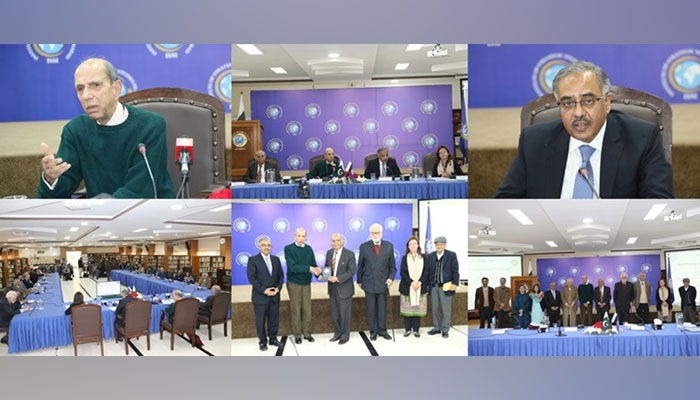ISSI hosts public talk on stabilising Pakistan’s economy
Islamabad:The Centre for Strategic Perspectives (CSP) at the Institute of Strategic Studies Islamabad (ISSI), organised a public talk on ‘Stabilising Pakistan's Economy.’ The guest speaker at the event was Mueen Afzal, former secretary general, Ministry of Finance and Economic Affairs.
In her introductory remarks, Dr. Neelum Nigar, Director CSP, emphasised the significance of today's talk, which delves into a crucial topic. The economy has faced severe macroeconomic imbalances, with the recurring balance of payments crises, shortages of foreign exchange, and above all a lot of fiscal indiscipline. The economy has not been able to take off even with the series of financial stimuli provided by international financial institutions. This underscores the necessity to comprehend the fundamental aspects of the economy, allowing us to present practical policy recommendations.
In his welcome remarks, DG ISSI Ambassador Sohail Mahmood highlighted the significant economic challenges that Pakistan is currently facing, fostered by both internal and external factors, including the impact of global economic slow-down, Covid-19 pandemic, and food and fuel crises in the wake of Russia-Ukraine conflict and situation in the Middle East. He noted that Pakistan is grappling with a dual deficit challenge, involving both fiscal and current accounts, ultimately leading to a debt trap. Furthermore, the economy is confronted with rising inflation, food insecurity, energy crisis, and unemployment, adding to the already formidable set of challenges. These hurdles have hindered the nation's path to achieving sustainable growth. Ambassador Sohail Mahmood further emphasised that the implementation of necessary corrective measures, including redirection of resources toward social sectors, has been hindered by fiscal constraints, also resulting in a sluggish GDP growth rate. To stabilize the economy, a comprehensive but targeted approach is imperative, entailing sustained long-term growth through structural adjustments within the economic framework.
During his address, Mueen Afzal shed light on the recent challenges confronting the Pakistani economy. He attributed the country's economic woes to the misallocation of human resources. Afzal emphasised that while economic crises are surmountable, they necessitate a rigorous reform process. He highlighted the potential benefits of investments like CPEC, stressing that they must be utilised prudently. Afzal argued that stabilizing the economy relies on attaining sustainable growth, necessitating a minimum GDP growth rate of around 5 per cent. Specifically, he stressed combating poverty and inequality; fiscal discipline; increasing savings and revenues; responsible management of debt; trade diversification; conducive environment for FDI; structural reforms; and, above all, ‘sensible decisions.’ He underscored that the foremost concern presently is the escalating inflation, which impacts both exchange rates and interest rates.
Moreover, Mueen Afzal addressed the recurring challenge of the balance of payments, advocating for a strategic focus on trade policies and diversification of exports as imperative solutions. A manageable current account balance, he noted, is vital for maintaining a stable rupee, a prerequisite for sustainable growth. In conclusion, he pointed out that Pakistan's public spending is limited, remaining below 20 per cent. This limitation hinders investment in crucial public infrastructure, further worsening inequality within the nation.
Following the presentation, participants engaged in an interactive discussion. The event concluded with a vote of thanks delivered by Ambassador Khalid Mahmood, Chairman of the Board of Governors at ISSI.
-
 Pentagon Threatens To Cut Ties With Anthropic Over AI Safeguards Dispute
Pentagon Threatens To Cut Ties With Anthropic Over AI Safeguards Dispute -
 Meghan Markle's Father Shares Fresh Health Update
Meghan Markle's Father Shares Fresh Health Update -
 Travis Kelce Takes Hilarious Jab At Taylor Swift In Valentine’s Day Post
Travis Kelce Takes Hilarious Jab At Taylor Swift In Valentine’s Day Post -
 NASA Confirms Arrival Of SpaceX Crew-12 Astronauts At The International Space Station
NASA Confirms Arrival Of SpaceX Crew-12 Astronauts At The International Space Station -
 Can AI Bully Humans? Bot Publicly Criticises Engineer After Code Rejection
Can AI Bully Humans? Bot Publicly Criticises Engineer After Code Rejection -
 Search For Savannah Guthrie’s Abducted Mom Enters Unthinkable Phase
Search For Savannah Guthrie’s Abducted Mom Enters Unthinkable Phase -
 Imagine Dragons Star, Dan Reynolds Recalls 'frustrating' Diagnosis
Imagine Dragons Star, Dan Reynolds Recalls 'frustrating' Diagnosis -
 Steve Jobs Once Called Google Over Single Shade Of Yellow: Here’s Why
Steve Jobs Once Called Google Over Single Shade Of Yellow: Here’s Why -
 Barack Obama Addresses UFO Mystery: Aliens Are ‘real’ But Debunks Area 51 Conspiracy Theories
Barack Obama Addresses UFO Mystery: Aliens Are ‘real’ But Debunks Area 51 Conspiracy Theories -
 Selma Blair Explains Why Multiple Sclerosis 'isn't So Scary'
Selma Blair Explains Why Multiple Sclerosis 'isn't So Scary' -
 Will Smith Surprises Wife Jada Pinkett With Unusual Gift On Valentine's Day
Will Smith Surprises Wife Jada Pinkett With Unusual Gift On Valentine's Day -
 Shamed Andrew Has Paid Royal Favours With ‘national Scandal’
Shamed Andrew Has Paid Royal Favours With ‘national Scandal’ -
 Prince William Ticked Off By How Andrew ‘behaved With Staff’
Prince William Ticked Off By How Andrew ‘behaved With Staff’ -
 Prince William Questions Himself ‘what’s The Point’ After Saudi Trip
Prince William Questions Himself ‘what’s The Point’ After Saudi Trip -
 James Van Der Beek's Friends Helped Fund Ranch Purchase Before His Death At 48
James Van Der Beek's Friends Helped Fund Ranch Purchase Before His Death At 48 -
 King Charles ‘very Much’ Wants Andrew To Testify At US Congress
King Charles ‘very Much’ Wants Andrew To Testify At US Congress




